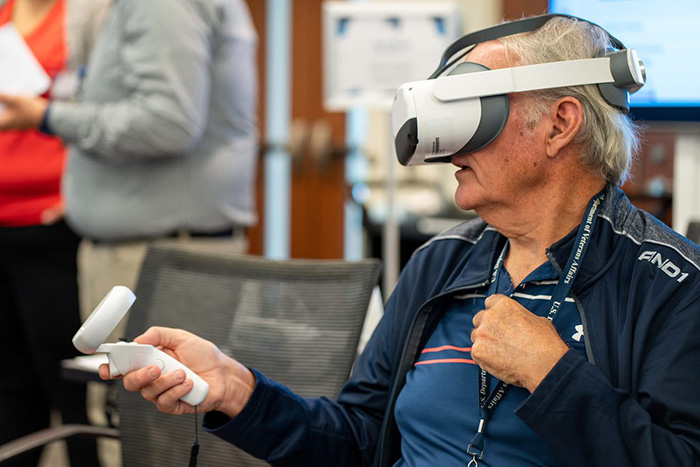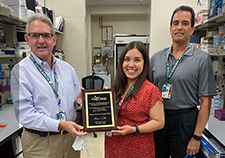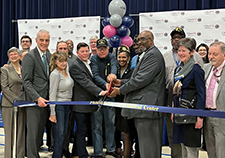Office of Research & Development |
 |


A Veteran at the Orlando VA Medical Center in Florida tries out virtual reality technology. (Photo courtesy VA Immersive team)
May 11, 2023
By Erica Sprey
VA Research Communications

VA researchers using AI to decide best treatment for rectal cancer

VA center training the next generation of researchers in blood clots and inflammation

AI to Maximize Treatment for Veterans with Head and Neck Cancer

VA opens new research center to seek novel arthritis treatments
The 2023 National VA Research Week, May 9-12, is celebrating "Cutting-Edge Care Through Research." Since 1925, VA researchers have been discovering new ways to treat disease and improve Veterans' health. VA has a proud history of investigating cutting-edge technologies that have the potential to revolutionize clinical care.
Dr. Anne Lord Bailey is the immersive technology lead for the VA Office of Healthcare Innovation and Learning (OHIL), a program office that focuses on driving the discovery and use of innovative healthcare solutions for Veterans. Bailey and the VA Immersive team are working hard to identify and promote technologies like virtual reality (VR) across the VA health care system.
“Our goal is to test and evaluate thoughtfully designed and developed solutions that respond to Veteran and VA-specific health care needs,” said Bailey. “We believe immersive technology is defining a new reality in Veteran health care, and we’re excited to see growth and expansion of a clinical tool that Veterans and VA staff continue to request.”
VA has implemented a number of VR applications in more than 30 different use cases across VA medical centers in all 50 states and Puerto Rico, helping to improve rehabilitative care, staff training, and the treatment of health conditions like post-traumatic stress disorder (PTSD) and chronic pain.
Most people who have tried virtual reality can appreciate how impactful the immersive experience can be. VR engages the senses in such a realistic manner that people can briefly forget where they are or what they are feeling. It is that act of distraction and sense of presence that can help patients who are experiencing post-operative pain or other distressing conditions and stressors. Additionally, they can also learn new skills and engage in social interactions, among many other clinical and non-clinical opportunities.
In 2017, Caitlin Rawlins, RN, of the VA Immersive team, recognized a need for more nonpharmacological and noninvasive pain management options in VA healthcare. She began leveraging the positive distraction potential of VR to interrupt post-operative pain and anxiety signals and saw immediate positive responses from Veterans.
Veterans previously in pain often described the experience, in addition to pain intensity scores, through candid remarks such as “I forgot about my pain,” “This took me out of these four walls to be able to relax,” or “This allowed me to feel less pain so I could do my physical therapy.” Pain, both acute and chronic, continues to be one of the top requested indications for immersive technology in VA healthcare.
Since the program’s launch at the Asheville VA Medical Center, the program has expanded from a single patient unit to multiple in-patient units, the Community Living Center, outpatient units like oncology and physical medicine, and hospice. Nearly 85% of users experienced a reduction in anxiety and more than 65% felt that their pain lessened with an average 30% decrease in pain intensity. While one of the earliest examples, VA now leads the country in clinical implementation of immersive technology and has deployed over 1,200 VR headsets across more than 160 VA medical centers.
To hear Veterans talk about their experiences using VR during the 2022 Veteran eXpeRiance event, click here. To learn more about VA Immersive technology, or to find a local site, visit VA Immersive online.
VA Research Currents archives || Sign up for VA Research updates